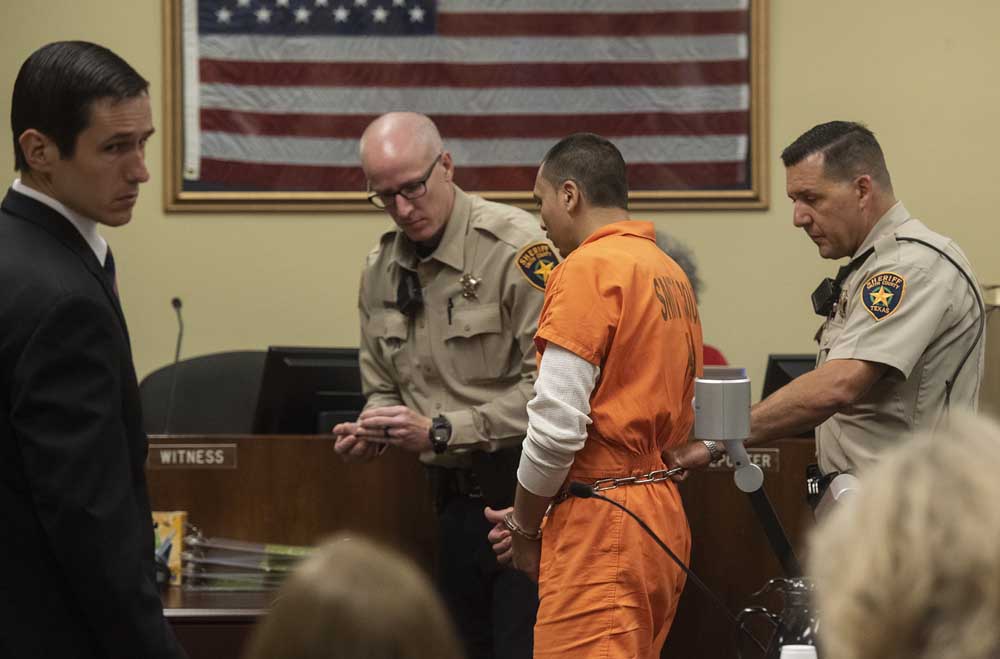East Texas man convicted of murdering child in 2016 seeking court documents
Published 6:23 pm Monday, April 12, 2021

- Smith County District Attorney Jacob Putman (left) is pictured during a pretrial hearing for defendant Gustavo Zavala-Garcia, 27, (right) on Thursday, Aug. 22, 2019, in the 241st District Court. Zavala-Garcia, who was accused of killing 10-year-old Kayla Gomez-Orozco in November 2016, entered a guilty plea and was sentenced to life in prison without parole. (Sarah A. Miller/Tyler Morning Telegraph/File)
A man convicted of murdering 10-year-old Kayla Gomez-Orozco in November 2016 is seeking documents related to his case, in which he pleaded guilty and was sentenced to life in prison without parole.
Gustavo Zavala-Garcia, 28, of Bullard, entered a guilty plea to capital murder in August 2019 for the death of Gomez-Orozco.
Trending
On Jan. 27 this year, Zavala-Garcia wrote to the attorney who represented him in the capital murder case, J. Brett Harrison, requesting documents involved in the criminal court case.
Harrison then filed a request on Feb. 1 asking the court for permission to release information to Zavala-Garcia. Harrison noted that discovery documents are “voluminous” and consist of 6,615 pages.
A court hearing over the matter is set for this Tuesday in the 241st District Court.
According to the filing, Zavala-Garcia wants a digital copy of all documents and items Harrison has stored electronically so that Zavala-Garcia can forward it to his family for safekeeping. He also wants a condensed (two-panel) and duplexed (double sided) paper copy of the electronically-stored potions of the file and the nonelectronically-stored portions.
Zavala-Garcia requested that the file include all correspondence between and among counsel and Zavala-Garcia, the state, any investigating agency, any expert witness, any fact witness, co-counsel, defense investigators, any court clerk, any court, or any other person or entity related to this case. He wants all volumes of the clerk’s and the reporter’s records produced and filed in the case.
He is also seeking all documents and items received by counsel, all notes and other work product generated in the case, all pleadings and other papers drafted and/or filed by anyone in the case and all discovery items.
Trending
Zavala-Garcia is asking for all orders of appointment or substitution, counsel’s most recently filed mandatory disclosure of percentage of appointed work, and all other documents and items related to the case not prohibited from disclosure.
He also requested an index of withheld or redacted documents and items with an explanation for such withholdings or redactions.
Harrison asked the court that he be reimbursed for any expense incurred in providing a copy of this written discovery and the other requested items to Zavala-Garcia.
After Harrison filed the request for documents, Smith County District Attorney Jacob Putman filed an objection on Feb. 2.
Putman noted a part of the Texas Code of Criminal Procedure that states a defendant’s attorney or counsel can allow the person they’re representing to view the information, but “may not allow that person to have copies of the information provided, other than a copy of the witness’s own statement.”
Putman said in the document that the code prohibits the release of the state’s discovery information to a defendant, such as Zavala-Garcia. He asked that the court deny Zavala-Garcia’s documents request.
Zavala-Garcia’s Court CaseZavala-Garcia, who was related to Gomez-Orozco by marriage, was one of the last people to see her before she went missing Nov. 1, 2016, from the foyer of Bullard First Assembly on U.S. Highway 69.
Her body was found four days later in a well on the property, where Zavala-Garcia lived, in the 22100 block of Farm-to-Market Road 2493 (Old Jacksonville Highway) in Bullard.
In the Zavala-Garcia’s indictment, prosecutors contended Zavala-Garcia kidnapped Gomez-Orozco and either sexually assaulted or attempted to sexually assault her. Prosecutors also contended he struck the girl with and against a blunt object, asphyxiated her and drowned her.
His guilty plea deal was made after the district attorney’s office attempted to seek the death penalty.
The defense attorneys said Zavala-Garcia had an intellectual disability, and the prosecution later brought in their own expert who found Zavala-Garcia intellectually disabled.
Putman said at the time it would be impossible to sentence Zavala-Garcia to death because of the longstanding U.S. Supreme Court precedent on executing intellectually disabled people, and that life without parole was the highest possible sentence.






